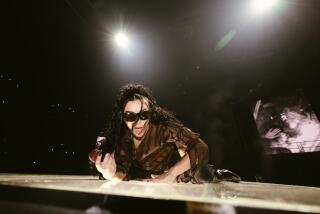O.C. Pop Music Review : Ray Charles Show: Not as Short, Definitely as Sweet
- Share via
COSTA MESA — Not that Ray Charles has a reputation for brevity or anything, but we did have a little pool going here at the office with folks placing estimates on just how short his show at the Orange County Performing Arts Center on Thursday would be. Those guesses ranged from 27 to 61 minutes.
For a fellow who professes that playing music is what he lives for, Charles sure doesn’t do a lot of it in public. His concerts have indeed been as short as 27 or 35 minutes; on the best nights, you might get 55 out of him.
While one person exiting the $44 section of the Center on Thursday was heard to grumble, “Only an hour?” he didn’t know how lucky he was. Not only did Charles deliver a relatively generous 62-minute show (not counting the four instrumentals his band played before he appeared), but a surprisingly soulful outing as well.
Particularly at some of his O.C. club appearances, Charles has merely cruised through his hits on autopilot. At the center, though, he reaffirmed his title as “the Genius,” and showed that, as was the case with Einstein’s most challenging equation, genius needn’t be long-winded.
His 13 songs gave anyone listening plenty to ponder. Charles is practically a one-man junction of the original popular music styles of this century. His career has spanned combo and big-band jazz, raw blues, R&B; in all its permutations, country and rock. He, in turn, has had an incalculable influence on those forms.
And all of Charles’ work, except perhaps his earliest, which was emulative of Nat King Cole, has been shaped by his singular spirit.
The way Charles moves on stage is clearly unfettered by the decorum of the sighted. His legs kick out spasmodically to the music, his frame rocks, emotion twists his face, unchecked by concerns of how he might appear.
Yet, that is just the merest reflection of a greater abandon that characterizes his music on a good night. He takes his voice to places other singers--particularly the sort that typically populate the center’s stage--studiously avoid.
His voice cracks; it whines; it grunts and cries. It’s a voice that admits to weakness, that not only sings of lost love, but also does so with the sounds most of us only utter alone in our personal darkness.
It’s a voice that also reaches for glory, with a radiance that’s a glory in itself. As noted critic Henry Pleasants has put it, Charles’ exultant singing has made him “one of the greatest of all gospel singers, without ever singing gospel!”
While one wouldn’t want to trade his late ‘50s Newport Jazz Festival performances for his center show, it was still pretty marvelous. There were a few little-heard numbers in the set, and even songs he’s been doing for three decades were given fresh turns and emotional insights.
Sporting a black, gray and white plaid sports coat, Charles was led on stage, but he led the way from there, his 17-piece orchestra responding to his every musical nuance. “I’m Busted” and “Georgia”--songs he must have sung at least 3,000 times apiece by now--were rich in vocal asides, and his effortless slides into his falsetto voice on the latter tune could have made time stop and take notice.
Unlike Sinatra, his phrasing didn’t so much illuminate words as it did reach to the emotion behind them. That was the case in his bringing out the heartache in his 1959 “Just for a Thrill.”
It’s a fairly maudlin lyric--”You filled my life with joy / But I was merely your toy” and so on--but he made it sob. When he chose to, he could also inhabit the lyric, as on Rodgers and Hammerstein’s “Oh, What a Beautiful Morning,” making that “The cattle are standing like statues” line vivid.
He was playing an electronic keyboard, and its varied palette--including the sounds of piano, organ, vibes and pure ‘70s synths--didn’t make up for the greater expression Charles gets out of a real piano or even a Rhodes electric one. It also went glitchy on him in a couple of spots, prompting him to remark: “You never know about these things. Computers, you know.”
Other songs included a strong reading of the ‘70s Leon Russell ballad “Song for You”--his recent recording of the tune won him his 12th Grammy, in March--and the 1988 “Stranger in My Own Hometown,” co-written by Charles and Kenny Carr.
He brought on his five Raeletts to help him close out the show with “Don’t Change on Me,” “I Can’t Stop Loving You” (marked by a long, playful intro) and a bluesy workout on “I Believe to My Soul.”
The only letdown of the evening was the end: a pat, ventureless version of “What’d I Say” that did seem exhausted of emotion, and the brief instrumental snippet Charles let pass for an encore.
Opening singer Ernestine Anderson canceled due to illness and was replaced by comedian Lewis Dix Jr.
More to Read
The biggest entertainment stories
Get our big stories about Hollywood, film, television, music, arts, culture and more right in your inbox as soon as they publish.
You may occasionally receive promotional content from the Los Angeles Times.










